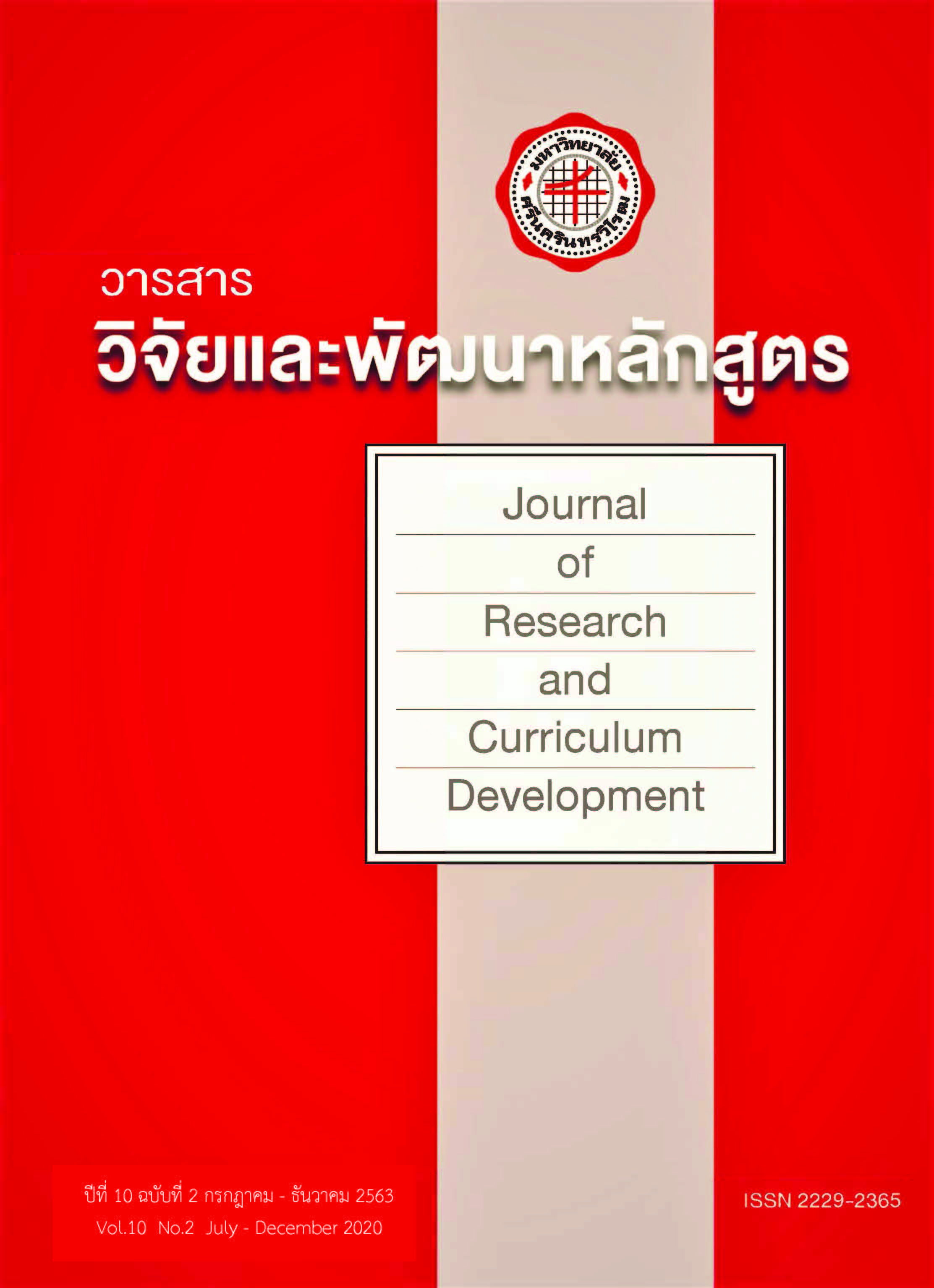การพัฒนาหลักสูตรเสริมสร้างทักษะชีวิตในยุคดิจิทัล สำหรับนักเรียนระดับชั้นมัธยมศึกษาตอนต้นของโรงเรียนสังกัดกรุงเทพมหานคร
Keywords:
Curriculum Development, Enhancing Curriculum, Life Skills in Digital Age, Lower secondary students, Schools of the Bangkok Metropolitan AdministrationAbstract
The purposes of this research were to 1) develop and determine efficiency of life skills enhancement curriculum in the digital age 2) study the effectiveness of life skills enhancement curriculum in the digital age. With a specific objective of 2.1) study life skills development in the digital age before, during and after using the curriculum. 2.2) study the students' satisfaction with using the curriculum to enhance life skills in the digital age. and 3) expand the curriculum to enhance life skills in the digital age. The sample comprised 31 9th grade students during in the first semester of the academic year 2019 at Wat Bangpakok School, Ratburana District, Bangkok. The research instruments consisted of curriculum and curriculum manual for enhancing life skills in the digital age. The data was analyzed by mean, standard deviation and content analysis. The results were as follows: 1. The life skills enhancement program in the digital age for lower secondary school students in schools of the Bangkok Metropolitan Administration consisted of six elements. These are 1) principles 2) objectives 3) curriculum development stages consisting of four steps which are (1) Needs Analysis (2) Integrated to Content (3) Create Experiential Learning (4)Evaluation 5)Measurement and evaluation 6)Conditions for curriculum implementation 2.The effectiveness of the curriculum indicated that 2.1) Students have the development of life skills in the digital age at the highest level. 2.2) Students are satisfied with using the life skills enhancement curriculum in the digital age at the highest level 3. The results of the dissemination curriculum that 3.1) Students have the development of life skills in the digital age at the highest level. 2.2) Students are satisfied with the curriculum for building life skills in the digital age at the highest level.
References
ประเวศ วะสี. (2542). วิสัยทัศน์ของกระบวนการเรียนรู้ในหลักสูตรการศึกษาขั้นพื้นฐาน. วารสารวิชาการ, 2(1), 8-11.
ยงยุทธ วงศ์ภิรมย์ศานติ์. (2540). หลักและวิธีการสอนทักษะชีวิต. กรุงเทพฯ: กองบริการการศึกษา.
วิจารณ์ พาณิช. (2558). การสร้างการเรียนรู้สู่ศตวรรษที่ 21. กรุงเทพฯ: มูลนิธิสยามกัมมาจล.
วิชัย วงษ์ใหญ่และมารุต พัฒผล. (2558). การโค้ชเพื่อการรู้คิด (พิมพ์ครั้งที่ 5). กรุงเทพฯ: จรัลสนิทวงศ์การพิมพ์.
สำนักงานคณะกรรมการการศึกษาขั้นพื้นฐาน. (2553). การพัฒนาทักษะชีวิตในระบบการศึกษาขั้นพื้นฐาน.
กรุงเทพฯ: สำนักวิชาการและมาตรฐานการศึกษา สำนักงานคณะกรรมการการศึกษาขั้นพื้นฐาน กระทรวงศึกษาธิการ.
สำนักงานคณะกรรมการการศึกษาขั้นพื้นฐาน. (2554). การเสริมสร้างทักษะชีวิตตามจุดเน้นการพัฒนา
คุณภาพผู้เรียนระดับประถมศึกษาถึงมัธยมศึกษา. กรุงเทพฯ: ชุมนุมสหกรณ์การเกษตรแห่งประเทศไทย.
สำนักงานเลขาธิการสภาการศึกษา กระทรวงศึกษาธิการ. (2560). แผนการศึกษาแห่งชาติ พ.ศ.256พ.ศ.2579. กรุงเทพฯ: กระทรวงศึกษาธิการ.
สำนักงานสภาพัฒนาการเศรษฐกิจและสังคมแห่งชาติ(2561) ยุทธศาสตร์ชาติ 20 ปี (พ.ศ.2560-พ.ศ.2580). กรุงเทพฯ: สำนักงานสภาพัฒนาการเศรษฐกิจและสังคมแห่งชาติ.
ภาษาอังกฤษ
Maxwell, Robert. (1981). Life After School: A Social Skills Curriculum. New York: Pregamom International Library.
Ornstein, & Hunkins. (1993) Curriculum Foundations, Principles and lssues (2nd ed.). Boston: Allyn and Bacon.
Taba, Hilda. (1962). Curriculum development : theory and practice. New York: Brace & World.
Tyler, Ralph W. (1962). Basic principles of curriculum and instruction. Chicago: University of Chicago Press.
Tyler, Ralph W. (1949) The Functions of measurement in improving instruction, in E.F. Lindquist (E.d.). Education Measurement. New York: American Council on
Education.
UNICEF. (2018). Life Skills. Retrived October 10, 2018. from http://www.unicef. org/ lifeskills/index.html.
Wagner, T.(2008). The global achievement gap: Why even our best schools don’t teach the new survival skills our children need and what we can do about it.
New York: Basic Books.
World Health Organization. (1993). Life Skills Education in School. Geneva: WHO.





